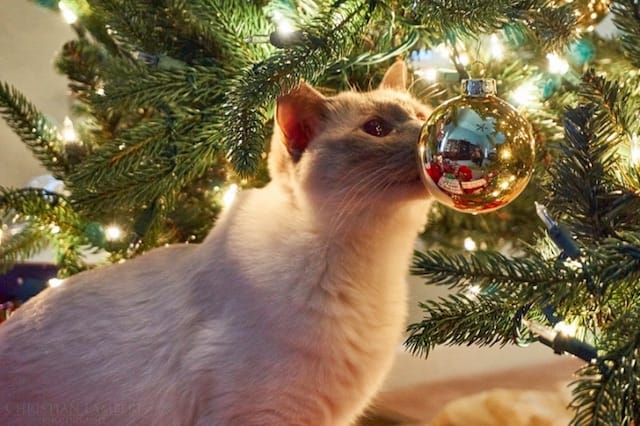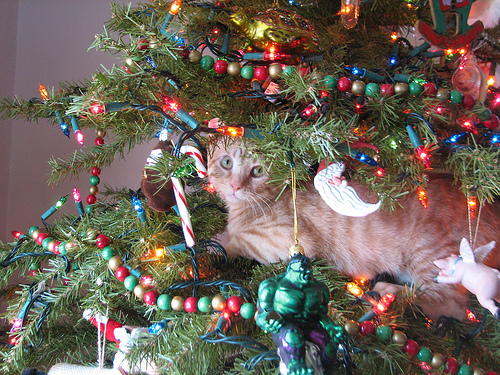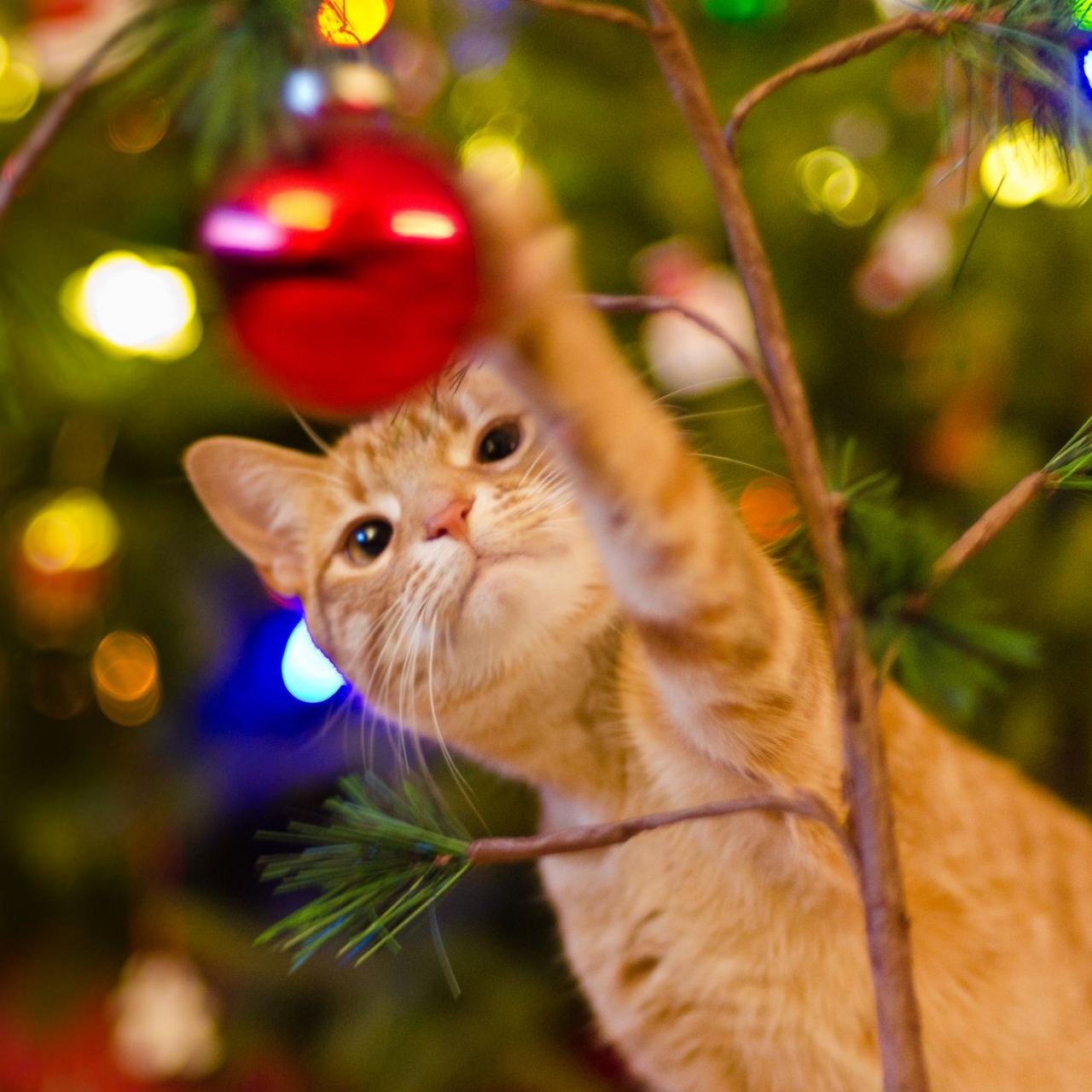Live Christmas trees are a bit dangerous to bring to your house. The dry leaves can start a fire, the falling tree can hurt your children, and the decorations and tree oils can harm your cat internally. So, taking some precautions while bringing live Christmas trees is necessary for homeowners.
While Christmas trees are “mildly toxic” for your pets, the oil and tree needles can cause mild to severe symptoms in pets, especially cats. While the Fir tree oil can cause vomiting and drooling, tree needles can even puncture your cat’s intestine if ingested.
Most concerning is the water trapped in the base of the tree, where most of the pesticides are applied. If your thirsty cat drinks water from the base, it may develop stomach issues.
Decorations, like lights, flowers, ornaments present pretty apparent dangers. Your cat can chew on the live lights or strangle itself with those. Whatever they do, the damage of electrocution is inevitable unless you train them to be distant from the tree.
1. Are Christmas Trees Harmful to your Cat:
Until and unless your cat doesn’t try to eat it, fir and pine trees aren’t exactly poisonous to your feline friend. But if your cat feeds on the sap, drinks the water, and ingests the pine needles, they are in serious trouble. Pine needles are particularly critical for your cat. Ingesting pine needles can rupture the intestine and potentially cause liver damage and death.
Perhaps the biggest danger for your cat is lying beneath the tree, the basin. The water often contains pesticides and molds, which can be upsetting for your cat.
The artificial Christmas trees can cause blocked intestines in your cat if the nylons are ingested.
Lighting, glitters are like a dream coming true for your cat, they often do the deed while trying to explore the elements and in the process, either harm themselves, or their owner.
2. What are the Symptoms of Christmas tree Poisoning:

Typically, Christmas three poisoning is as same as alcohol and caffeine poisoning in cats, just milder. The elementary symptoms are lethargy and an upset stomach, but more severe symptoms may occur depending on the chemicals and pesticides used to enhance the tree. Some severe symptoms include:
- Kidney failure: change in hunger, urination, and thirst.
- Liver Damage: Upset stomach, stomachache, and discoloration of eyes and gums.
- Muscle Weakness: In some severe cases, muscle tremors and seizures can be observed.
- Drooling
In case of severe symptoms, contact your vet immediately. If you believe that your kitty has ingested pine needles, it’s possible they won’t even show any symptoms before surrendering, contact emergency support as soon as possible. the vet may administer activated charcoal to clear up your cat’s stomach from toxins.
3. How to Stop Your Cat from Eating Christmas Tree:
- Bring an artificial tree with inbuilt lights and greenery to reduce the potential damage the tree can do to your kitty.
- Consider covering the base of the tree with tin foils, apparently, cats don’t like their pawn touching tin foils.
- Use an anti-scratch spray all over the tree to deter your cat away.
- Wash your tree thoroughly outside to make them cat safe before bringing them in.
4. Which Food Your Cat Can’t Eat in Christmas:

Let’s look at some foods and ingredients your cat can’t digest and shouldn’t be fed:
- Raw Dough: Just as we discussed, raw dough is pretty harmful to your pet.
- Raw eggs, raw meat, and bones: Domestic cats have separated from their family tree a long ago. While wild cats still rely on rough diets, your cat is most used to digest cooked food.
- Sweets and drinks: Cats can’t taste the sweetness and there’s good cause for it. Sweet drinks and foods don’t include anything nutritious for them.
- Raisins and grapes: Steamed sprouting veggies once in a while are good for your cats, but never fruits.
- Dairy Products: Cats are lactose intolerant, they shouldn’t be served anything dairy-related.
- Alcohol: No animal should be subjected to alcohol. Alcohol intoxication in cats is not like us, it’s poisonous for them. Alcohol takes a serious toll on their nervous system and can be fatal if left unchecked.
- Onion and Garlic: While a small amount of onion may not hurt your cat, but a humble amount of garlic can do.
5. How to Dispose of The Christmas Tree Cat Safe:
- Firewood: Pine and Fir are heavy sap trees and are very best for firewood. The sap is flammable and burns hot and fast.
- Make compost out of the Christmas trees, pine needles are nutritional and make the best compost.
- Hang bird feeders to attract birds to your tree, so you can enjoy the wildlife.
- Wood ash contains potassium, after burning your tree, spread the ashes to the garden as fertilizers.
- Pine needles can be used as fresheners. Keep them in a bag or sachet to use as fresheners.
- Contact local disposal services or authorities to take care of your Christmas tree.
The Bottom Line:
Christmas is around the corner and your Christmas spirit is at its peak. Your cat can sense your excitement and is all around happy. Keeping them safe and giving them a safe environment to explore around falls upon you. While Christmas trees are not harmful in general, but the sap and the pine needles can be quite a hassle to deal with. To keep your cat safe, follow this article and don’t bring your guard down.
Pines and other Christmas trees also can cause mechanical harm to your pets. The stiff, pointed end can scratch their skin up from outside and puncture the throat and intestine from inside – which can be life-threatening.
Strings can twist around your cat’s neck or intestines to harm them physically.
If your cat is a climber, there’s a risk of injury from falling down of the tree or breaking a branch.
Always refer to ASPCA’s list of toxic and non-toxic plants before adding greenery to your house. But if your cat chews on the tree, contact your vet immediately.
